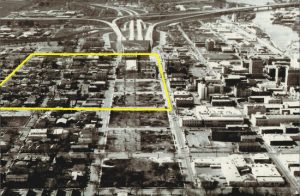Little Manila: The Recovered Soul of Stockton
Historically, Stockton was home to the largest population of Filipinos in America. Many Filipinos had been specifically recruited to Stockton as agricultural and domestic workers, and they became the largest agricultural workforce for Central Valley. Attracted by the “American Dream” and the chance to lift their families out of poverty, young Filipino immigrants arrived in droves, ready to make it big.
The reality was strikingly different from the dreams and opportunities that they were taught. The year 1898 was the beginning of American colonization of the Philippines, and while the teachers touted the liberties of America, they had failed to mention of the existing issues of discrimination and racism.
But that would not deter the Filipinos. Although they were spread out across the west coast, they created a space for themselves in Stockton right next to Chinatown and Japantown. This “Little Manila” was a thriving community— a central hub for all Filipinos to gather, network, and even reunite with family and friends who were just arriving onto American soil.
 Covering a four-block area, the boundary of Little Manila extended from south of Main Street to Lafayette and El Dorado Streets. It held many Filipino-owned businesses and organizations, including: restaurants, union halls, hotels, grocery stores, dance halls, barber shops, garages, and much more.
Covering a four-block area, the boundary of Little Manila extended from south of Main Street to Lafayette and El Dorado Streets. It held many Filipino-owned businesses and organizations, including: restaurants, union halls, hotels, grocery stores, dance halls, barber shops, garages, and much more.
As the economy took a downturn from the Great Depression, Filipinos faced even more discrimination and competition for jobs. They found work in the agriculture industry and eventually became the largest and main labor workforce in Central Valley. They harvested produce season after season, rain or shine. And one of the toughest crops to work with, asparagus, was skillfully and efficiently harvested by them. However, the working conditions were tough, and the meager pay of 90 cents for 100 pounds of asparagus a day was unfair compared to others who were getting paid higher wages and working under better conditions.

Fed up with the treatment they were receiving, the Filipino American community formed labor unions and held strikes against exploitative growers. It was tedious and grueling work, but their eventual success was worth it. In 1939, the Filipino Agricultural Laborers Association (FALA) won their strike against the asparagus industry. This massive victory sparked further successful union strikes across the land. Their success was critical in paving the path forward for future labor workers, including the famous 5-year Delano grape strike led by Larry Itliong, Ceasar Chavez, Philip Vera Cruz, Lupe Martinez, Dolores Huerta and Richard Chavez.
As World War II raged on in 1939, many Filipinos enlisted into the U.S Army. With their enlistment, Filipinos were granted citizenship, and the public perception of Filipinos in America changed for the better. These soldiers were often stationed in the Philippines, ended up marrying Filipina wives, and brought them into the States to start a family. After World War II, the Filipino community in Stockton thrived with new life, energy, and vigor. In 1946, it became the biggest Filipino community in the States.
Sadly, this came crashing down in the 1950s and 1960s, when the City of Stockton began their new urban redevelopment plan. Huge parts of Little Manila were torn down to make way for a large freeway and other fast food franchises. In 1970, the funding for the freeway construction ran out, and left the freeway as a “road to nowhere” while Little Manila and its community remained irreparably damaged and displaced.
 However, the Filipino-American community members were resilient, and in 1972 they succeeded in building the Filipino Plaza to reclaim a space for the displaced Filipino community in Stockton. In 1994, the Filipino American National Historical Society designated Stockton as the site for the Filipino American National Historical Society Museum, which opened in 2015. Thanks to the efforts of the Stockton FANHS and other new Filipino-American leaders, the Little Manila District was named one of the nation’s most endangered historic places of 2003 by the National Trust for Historic Preservation. This would include historic buildings such as the Mariposa Hotel, the Rizal Social Club, and the Filipino Recreation Center.
However, the Filipino-American community members were resilient, and in 1972 they succeeded in building the Filipino Plaza to reclaim a space for the displaced Filipino community in Stockton. In 1994, the Filipino American National Historical Society designated Stockton as the site for the Filipino American National Historical Society Museum, which opened in 2015. Thanks to the efforts of the Stockton FANHS and other new Filipino-American leaders, the Little Manila District was named one of the nation’s most endangered historic places of 2003 by the National Trust for Historic Preservation. This would include historic buildings such as the Mariposa Hotel, the Rizal Social Club, and the Filipino Recreation Center.
Even today, in 2020, the non-profit organization, Little Manila Foundation, co-founded by the late Dr. Dawn Bohulano Mabalon and Dillon Delvo, continues their efforts to preserving, restoring, and reclaiming Little Manila District. Founded in 1999, the Little Manila Foundation has created many programs to rebuild and connect the Filipino community together in Stockton, while educating the youth on the historic Filipino American contributions and struggles in America.
Although the flourishing community of Little Manila is no longer here, the residents of Little Manila District are still committed to reclaiming the importance of their history. You can help the Filipino American community by learning more about Stockton’s Historic Little Manila at the FANHS Museum or getting involved with the the Little Manila Foundation. You can also read about the history of Little Manila by picking up a copy of Little Manila Is in the Heart: The Making of the Filipina/o American Community in Stockton, California authored by Dr. Dawn Bohulano Mabalon.
Share on Social Media
Recent Posts
7 Content Marketing Mistakes to Avoid
Content marketing has plenty of benefits: It increases website traffic, qualifies leads, and brings in more customers. However, with millions of blogs, checklists, and videos competing for attention,…
May 13, 2025
How to Build a Simple Social Media Strategy for Your Small Business
Implementing a simple yet effective social media strategy can significantly enhance your small business's visibility and customer engagement. Here's a concise guide to help you get started:…
April 29, 2025
5 Simple Steps to Content Marketing Success
In today’s competitive market, content marketing remains one of the most effective ways to engage customers, build brand authority, and drive sales. But posting random content won’t get you…
April 15, 2025



